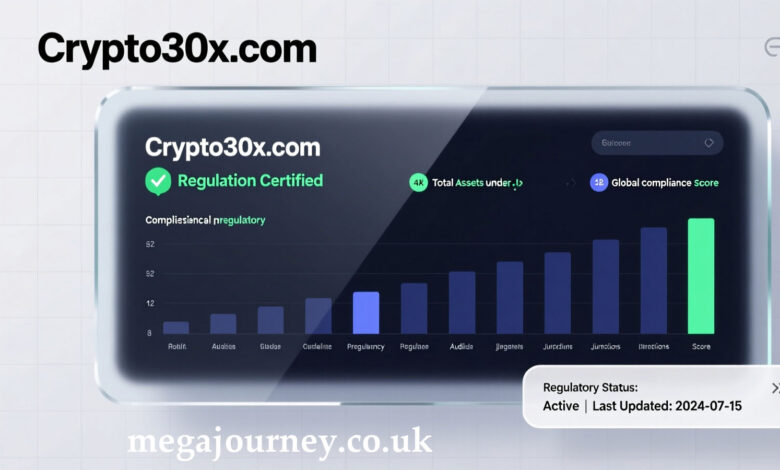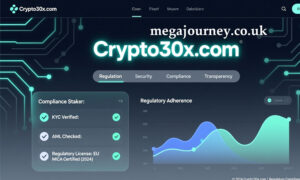Understanding Crypto30x.com Regulation: What It Means for Traders

In a world where cryptocurrency platforms rise and fall with alarming frequency, regulation has become a key filter for legitimacy. The term crypto30x.com regulation is gaining traction among traders, investors, and risk analysts. But what exactly does it mean when we talk about regulation in the context of Crypto30x? Is it a fully regulated exchange, or is the label more aspirational than factual?
This article dives deep into crypto30x.com regulation — exploring what regulation generally means in the crypto domain, how (or whether) Crypto30x aligns with those regulatory expectations, the risks and red flags traders should watch for, and practical tips to assess any platform’s legitimacy. Before the conclusion, you’ll find a Frequently Asked Questions (FAQs) section to address common concerns.
What Does Regulation Mean in the Crypto World?
To understand crypto30x.com regulation, we must first grasp what “regulation” means for cryptocurrency platforms more broadly.
The role of regulation in finance and crypto

In traditional finance, regulation ensures transparency, consumer protection, minimum capital reserves, auditability, and legal recourse in disputes. Cryptocurrencies operate in a more novel, often decentralized domain. As a result, regulatory regimes differ significantly across countries.
Governments and regulatory bodies typically focus on:
-
Anti-money laundering (AML) rules
-
Know Your Customer (KYC) identity checks
-
Licensing or registration of exchanges or custodial service providers
-
Oversight of derivatives, leverage, or margin trading
-
Consumer protection (disclosures, fair practices)
-
Enforcement and penalties for fraud or misconduct
In many jurisdictions, crypto regulation is still evolving—and the pace of change can outstrip the clarity of enforcement.
Thus, when a platform claims crypto30x.com regulation, it must be evaluated against real-world benchmarks: is it licensed, to what extent, and in which jurisdictions?
Crypto30x.com – The Claims vs. the Reality
Many platforms promote strong regulatory credentials to build trust. Crypto30x.com is no exception. But behind marketing language, the picture is often murkier.
What Crypto30x.com claims about its regulation
-
Some sources state that Crypto30x claims to hold a Malta Digital Asset Service Provider (DASP) license.
-
The platform ostensibly uses KYC / AML processes and regular audits to support its claim of regulatory compliance.
-
It may assert multi-jurisdictional licensing to appeal to global users.
What skeptical sources report
-
Some analysts note that Crypto30x.com’s oversight by major regulators such as the U.S. SEC or U.K. FCA is absent or unclear.
-
The reliance on a Malta license, while not useless, offers limited protection for users outside Malta.
-
Several user reviews and industry watchers warn of withdrawal delays, lack of transparency, or issues with accountability.
-
Some claim that in certain jurisdictions, trading derivatives or leverage on Crypto30x might breach local laws for retail users.
In short: while Crypto30x.com may claim regulatory credentials, it is not universally accepted or verified as fully compliant in every major jurisdiction.
Key Elements of a Sound Regulatory Framework

To judge how well crypto30x.com regulation holds up, let’s establish what a strong regulatory framework should include. Use these as a checklist when evaluating any crypto platform:
-
Public, verifiable license / registration
The platform should list its license(s) and allow users to cross-verify them with official regulators. -
KYC / AML processes
Mandatory identity verification and transaction monitoring are baseline expectations. -
Transparent audits / proof of reserves
External third-party audits or proof-of-reserves reports help verify solvency. -
Segregated, insured or regulated custody
Client funds should be stored in ways that distinguish them from company operating funds and mitigate risk. -
Clear user terms, redress mechanisms, and consumer protection
Users should have legal recourse in disputes, and the platform should disclose risks and fees. -
Compliance with jurisdictional laws on margin, derivatives, leverage
In many places, offering 30× leverage to retail users is prohibited or restricted.
If Crypto30x.com meets most or all of these criteria—and the claims are verifiable—then its regulatory claims gain weight. If not, caution is justified.
Risks and Red Flags Around Crypto30x.com Regulation
Even with claims of compliance, there are risks to consider specifically around crypto30x.com regulation.
Jurisdiction risk and enforceability
If a user is in a country foreign to where Crypto30x is registered (say, a non-Maltese user), enforcing legal claims can become difficult or impractical.
Leverage / derivatives offered to retail users
A “30x” leverage offering is aggressive. In several jurisdictions (e.g., U.K.), regulators ban or heavily restrict high leverage derivatives for retail crypto users. If Crypto30x offers 30× leverage, it may conflict with local regulations.
Transparency and proof
If the platform does not publicly present proof-of-reserves, audited financial statements, or external audits, its claims may lack substance.
Withdrawal and liquidity concerns
Delays in withdrawal, frozen accounts, or complex withdrawal procedures often emerge in platforms with weak regulatory backing. These are serious red flags.
Overpromising returns
If marketing emphasizes guaranteed high returns or 30× multipliers without adequate risk disclosure, that could signal misleading claims.
Lack of regulatory registration with key authorities
Absence of listing in major regulators’ public registers (e.g. SEC, FCA, etc.) weakens credibility.
How to Verify Crypto30x.com Regulation Yourself
If you want to evaluate if crypto30x.com regulation is meaningful, here are steps you can take:
-
Check the platform’s official website
Look for “Legal,” “Regulation,” or “Licensing” pages. They should list regulatory authority names, license numbers, and disclosures. -
Cross-verify with regulator databases
For instance, check Malta’s financial authority’s DASP registry, or U.S. SEC / CFTC and U.K. FCA registers. -
Search for third-party audits and proof of reserves
A credible, independent auditor increases trust. Lack of audits is a red flag. -
Read user experiences, especially withdrawal stories
Many times, issues surface in how money is moved off the platform. -
Check domain history and company incorporation details
Platforms with hidden or opaque ownership, frequent domain changes, or anonymous teams deserve extra scrutiny. -
Confirm KYC / AML processes yourself
Try partial account creation: see whether identity documents are requested and what the verification process involves. -
Check local laws and your country’s stance
Understand restrictions in your jurisdiction; even if Crypto30x is licensed elsewhere, local rules may prevent legal use.
Best Practices for Trading Even if Platform Regulation Is Unclear
Even if crypto30x.com regulation is not rock-solid, traders can still employ safer practices:
-
Use only funds you can afford to lose
-
Withdraw profits regularly rather than leaving large sums on platform
-
Enable strong security (2FA, hardware keys)
-
Avoid extreme leverage unless confident in risk management
-
Monitor platform announcements for regulatory changes
-
Use smaller positions and diversify across platforms
-
Keep detailed records of all transactions for legal or tax purposes
Conclusion
The notion of crypto30x.com regulation may inspire confidence at first glance. However, in practice, the regulatory status of Crypto30x.com remains uncertain in many major jurisdictions. The platform’s claims (such as a Malta DASP license and KYC/AML policies) are not inherently disqualifying, but they demand scrutiny and verification.
Frequently Asked Questions (FAQs)
1. Is Crypto30x.com definitively regulated?
No. While it claims to hold a Malta DASP license and adhere to KYC/AML standards, it is currently not verified to be fully regulated in major jurisdictions like the U.S. or U.K.
2. Can I trust crypto30x.com regulation claims?
You should treat them cautiously unless you can independently confirm license status, audit reports, and regulatory registration.
3. What risks do unregulated or lightly regulated platforms pose?
Risks include difficulty recovering funds, lack of legal protections, hidden fees, withdrawal issues, and potential platform shutdown.
4. Is it illegal to use Crypto30x.com in my country?
It depends on your country’s regulations. For example, U.S. users may face issues if the platform isn’t registered with the SEC or CFTC. U.K. users might be restricted from accessing leveraged crypto derivatives.
5. How does leverage (30×) affect risk?
High leverage magnifies both gains and losses. With 30x leverage, even small price moves can wipe out your capital quickly.
6. Does having a Malta license protect me?
It gives some sheltered legal structure in Malta, but enforcement across borders is complex and costly for individual users.
7. How should I verify legitimacy of any crypto platform?
Use the checklist in the “How to Verify” section above: check licenses, audits, user feedback, domain history, and regulatory registers.
Also Read : Thorn-Magazine Blog Band: Exploring the Rise of Independent Voices in Music